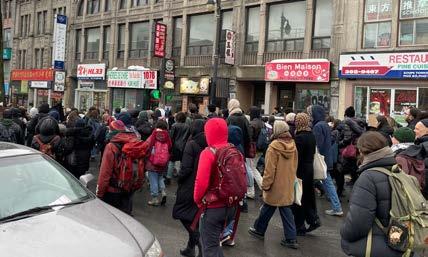
4 minute read
NATIVE WOMEN’S SHELTER OF MONTREAL ORGANIZES VIGIL FOR MMIWG2ST+
her, one of the ways Concordia could help Indigenous women is by creating more opportunities for Indigenous students with policies specifically designed for their needs.
pointed out that Indigenous communities, too, are finding their own solutions for educating youth.
Advertisement
“We don’t look to the University to do everything but we could certainly do more to help,” she said.
Montreal community members gathered on Feb. 10 to march for justice for 21-year-old rapper, poet, and boxer Nicous D’André Spring, who died on Dec. 24, 2022 while being illegally detained in Bordeaux Prison. Officials at the prison have stated that there was an altercation which led to the guards fitting him with a spit hood and pepper-spraying him twice. Spring was then taken to a hospital, where he later died. The circumstances surrounding Spring’s death have led to an investigation into the actions of the prison officials and the treatment of inmates at Bordeaux Prison.
The case has gained widespread attention, sparking public outcry over the treatment of prisoners and the need for reform in the criminal justice system.
As of Feb. 14, only one correctional officer involved in the altercation has been suspended, and the footage of the incident has not yet been released to the family. The, Justice for Nicous Action Committee, continues to call for the release of the footage of Spring’s death to advance justice for his family. The event organizers wore green bandanas on the upper arm to maintain visibility. At the start of the protest, Karim Coppry, one of the organizers, referenced the African proverb, “Il faut un village pour élever un enfant et le village est ici” (It takes a village to raise a child and the village is here), highlighting the importance of the community’s solidarity.
The march began at 1 p.m. and proceeded down Sherbrooke St. W. towards the Palais de justice de Montréal.
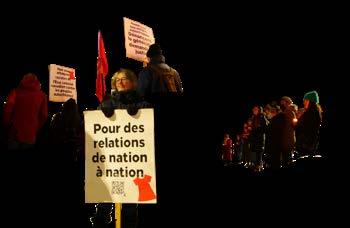
Protesters chanted slogans like “No justice, no peace” and “When Black lives are under attack, what do we do? Stand up, fight back.”
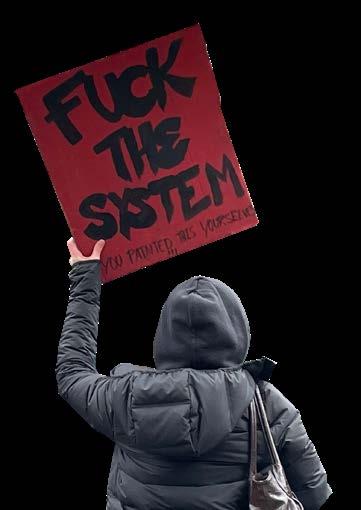
Marlene Hale, a Wet’suwet’en
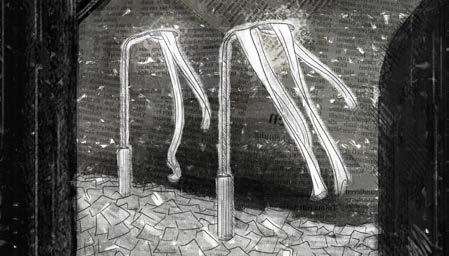
Elder, led the protest with the beat of her rallying drum.
Throughout the protest, Spring’s family members spoke, demanding justice for their loved one. Spring’s sister, Sarafina Dennie, and mother, Niquette Spring were in attendance.
“I’m just looking for justice,” said Spring’s mother.
Spring’s sister also expressed her grief and anxiety: “Every day, I wake up and hear a siren, and I have anxiety — we came here to have a different life, and you took that away,” referring to the guards at Bordeaux.
Protesters marched through Montreal, passing the Government of Canada building while shouting “release the video.” Volunteers wearing construction vests guided the crowd.
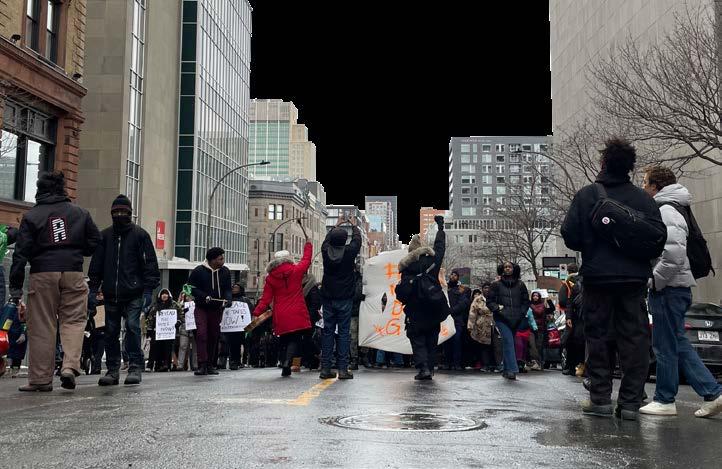
A child watched in awe at the number of protesters and waved at a police officer on a bicycle, unaware of the fight for justice happening all around her. The protest ended at the Palais de justice at 2:45 pm. Spring’s mother closed the protest. “I can’t sleep, I can’t eat, I can’t work. I need justice for my son!” she exclaimed.
BY SIMON FOURNET // ASSISTANT NEWS EDITOR
On Monday Feb. 14, Montrealers gathered at Cabot Square for a march in solidarity with Missing and Murdered Indigenous Women, Girls, Trans and Two-Spirit People (MMIWG2ST+) held by the Native Women’s Shelter of Montreal (NWSM). The vigil began at 6 p.m. with Indigenous activists, artists and community organizers speaking out against the violence inflicted on Indigenous people.
MMIWG2ST+ is a phenomenon across Canada (and more broadly across the Americas) of Indigenous women and persons of gender minorities going missing and being murdered. This feminicide crisis is understood by researchers as a consequence of colonialism and police inaction when it comes to Indigenous victims. It is estimated that Indigenous women in Canada are murdered at nearly seven times the rate of non-Indigenous women.
Nicole Janis QavavauqBibeau, the research coordi - nator for the Iskweu project at NWSM, believes that these figures are much higher.
Qavavauq-Bibeau’s research has found that the actual numbers of MMIWG2ST+ are four times higher than the RCMP estimate.
“When an Indigenous woman passes away, it is often ruled super quickly as a suicide or overdose,” said Qavavauq-Bibeau.
For Mohawk artist and activist Ellen Gabriel, this colonial vision of Indigenous women of all age groups comes from all layers of Canadian society. In a speech at the vigil, she mentioned how the Canadian government’s inaction regarding Indigenous people’s requests and the 231 Calls for Justice stemming from the National Inquiry’s Final Report into MMIWG2ST+ are the reasons why the current system is so reluctant to protect Indigenous women.
“When will you teach your children about the genocidal history in Canada, in Quebec, in all its provinces?” said Gabriel. “When is this going to happen? Because until this happens we are going to have vigils like this forever.”
Concordia’s Director of First Peoples Studies Catherine Kineweskwêw Richardson said this issue is on the minds of Indigenous scholars and professors at Concordia.
“In the scope of our program we educate students about the issue of MMIWG and I think we try to bring some issues in how the media talks about it,” said Richardson. “They never talk about who is kill ing these women.”
Richardson pointed out that the crisis is often framed as Indigenous women being vulnerable more so than focusing on the people perpetrating these crimes.
According to
Richardson’s research echoes the words of activists who argue that colonial violence stems from all institutions that were built on a colonial system, like the police, social services, as well as schools and universities.
“It’s a long term issue and if we don’t act to increase support for Indigenous students and Indigenous education, they’ll continue to fall off the edge,” said Richardson. “Like most universities, we at Concordia could be doing more to assist and uplift Indigenous students.”
For Richardson, some policies that could be implemented to help Indigenous students include encouraging them to go into graduate studies, building student housing, facilitating people moving from Indigenous communities to the city to study, and overall educating people around Indigenous issues. However, these solutions are slow to implement and the current administration is ill-suited to support Indigenous students.
“I’ve stopped holding my breath,” said Richardson. “For every aspect of life at Concordia, they have to understand









